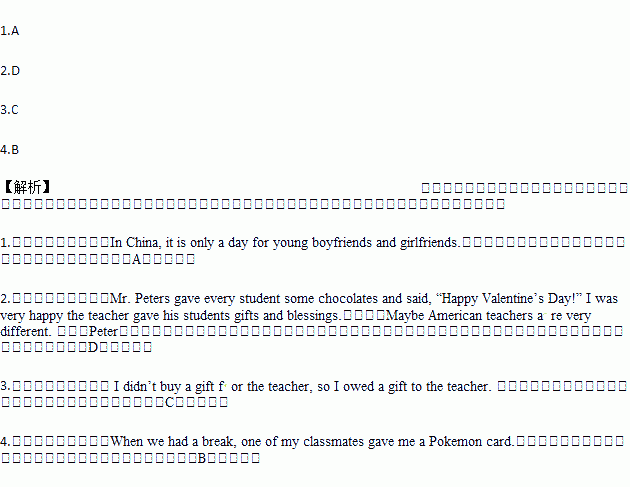题目内容
February 14th is Valentine’s Day! In China, it is only a day for young boyfriends and girlfriends. But my teacher and friends in America told me that Valentine’s Day is a public day.
This was my first Valentine’s Day in America. I didn’t understand the customs(风 俗) clearly. Maybe I didn’t need to send any gifts. I watched others to see what they did, so next time I can understand.
俗) clearly. Maybe I didn’t need to send any gifts. I watched others to see what they did, so next time I can understand.
On that day, when we began the reading class, Mr. Peters gave every student some chocolates and said, “Happy Valentine’s Day!” I was very happy the teacher gave his students gifts and blessings. I never saw that in China. Maybe American teachers  are very different. I didn’t buy a gift
are very different. I didn’t buy a gift  for the teacher, so I owed(欠) a gift to the teacher. Anyway, I want to say, ”Thank you, Mr. Peters, and I’m sorry.”
for the teacher, so I owed(欠) a gift to the teacher. Anyway, I want to say, ”Thank you, Mr. Peters, and I’m sorry.”
When we had a break, one of my classmates gave me a Pokemon card. It was very funny and I felt thankful, but I thought I owed a gift again.
When we were coming to our grammar class, suddenly I heard someone call ing me. ”Shelly!” I stopped. Another classmate who had only been in our class one day gave me some chocolates. She said, “These are for you and your friends. Have a good day!” I was looking at her leaving and thinking that we were in the same class only one day, but now we are friends. That’s very great, but I owed a gift again.
ing me. ”Shelly!” I stopped. Another classmate who had only been in our class one day gave me some chocolates. She said, “These are for you and your friends. Have a good day!” I was looking at her leaving and thinking that we were in the same class only one day, but now we are friends. That’s very great, but I owed a gift again.
When I came home, my Chinese friend sent some roses and chocolates.  I was surprised and happy because I had never received roses in my past life, but I hoped it was the last gift. I didn’t want to owe more gifts.
I was surprised and happy because I had never received roses in my past life, but I hoped it was the last gift. I didn’t want to owe more gifts.
1.Before the writer left China, she thought Valentine’s Day _______.
A. was a day for the young
B. was different in America
C. was a festival for all the people
D. was a holiday for the students
2.By saying “I never saw that in China,” the writer would like to tell us that in China _________.
A. the students gave gifts to the teachers
B. the teachers didn’t like the students at all
C. the students never received any gifts and blessings
D. the teachers wouldn’t give their students any gifts
3.The writer felt sorry probably because she ________.
A. made a mistake in class
B. didn’t like chocolate
C. had no gift for Mr. Peters in return
D. had no money to buy gifts
4.What was the first gift the writer received from his classmates?
received from his classmates?
A. A toy. B. A card. C. Some chocolates. D. Some roses.


 try to remember good moments to making me feel better. When I miss some friends or family member I also try to remember those happy moments we were spent together. In my opinion, the best way to help people be happy in life are to make them laugh every time we are feeling down. Also by give them love you can make them feel sure about themselves.
try to remember good moments to making me feel better. When I miss some friends or family member I also try to remember those happy moments we were spent together. In my opinion, the best way to help people be happy in life are to make them laugh every time we are feeling down. Also by give them love you can make them feel sure about themselves.